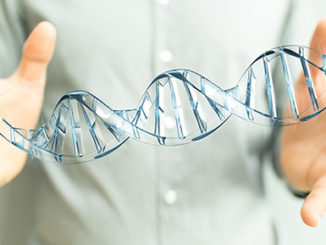Epigenetic inheritance, especially transgenerational epigenetic inheritance, is an important topic in epigenetic research. Do we pass down epigenetic marks to our children as a result of our lifestyle or behavior? Can this occur even long before conception and during pregnancy? Epigenetic studies suggest that the actions of a future mother or father can have long-lasting health effects on their children for years to come.
Studies show that certain DNA methylation marks can survive genome-wide reprogramming and be inherited. For example, a father’s exposure to phthalates could adjust epigenetic marks on sperm DNA and impact a couples’ ability to have children. A father’s diet and supplement intake could also influence his child’s mental fitness.
Mothers can influence epigenetic marks on their offspring’s DNA as well, changing how their baby will react to stress, whether or not they grow up healthy, and their ability to learn, remember and adapt as adults. The Mediterranean diet during pregnancy was shown to epigenetically reduce a child’s risk of disease.
Explore the ways in which lifestyle and habits of a mother and father – and potentially even grandparents or great-grandparents – may influence the epigenetic marks and health of later generations via epigenetic inheritance.
Check out our comprehensive e-book Epigenetics in Life: What We Eat to learn more about how different foods influence health.
Marks on a baby’s DNA might be able to predict whether he or she may develop conduct problems later in life, suggests new research published in Development and Psychopathology. Conduct problems — such as lying, stealing, and fighting — fit into a spectrum of behavioral and emotional issues found in youngsters in which basic social rules or the rights of others are violated. These behaviors are known to have a link to genetic factors and environmental influences. Now, there may [more…]
We often think that taking supplements is a good thing – but what if we consume too much? And could doing so negatively affect our children? Researchers from the German Center for Neurodegenerative Diseases (DZNE) found that fathers who consumed an excessive amount of certain supplements could epigenetically harm their offspring, affecting their children’s memory and learning ability. As we know, a mother has profound impact on her children and their development. Epigenetic research has shown that mothers can influence [more…]
Stories about a mysterious tool that can cut out and replace genes have crept out from behind the lab walls and entered boldly into the public spotlight. Nowadays, CRISPR is everywhere. And we can’t help but let our imaginations wander, especially when the questions posed by this novel gene editing technology come straight out of a sci-fi movie. Can we edit out bad genes that cause diseases in humans and replace them with healthy ones? Might parents be able to [more…]
Fifty years ago, a child diagnosed with acute lymphoblastic leukemia (ALL), the most common type of pediatric cancer, had little to no chance of survival. Today, those odds have increased dramatically thanks to tremendous advances in chemotherapy and other treatments. Cure rates for this type of leukemia can reach as high as 90 percent. Yet, there is one subgroup of pediatric ALL that is still very therapy resistant, T-Acute Lymphoblastic Leukemia (T-ALL). T-ALL is an uncommon, though aggressive, subclass of [more…]
not only harms your brain and body, but may also epigenetically impact your future children, a new study reports. Excessive drinking in adolescents could turn genes on or off in their offspring’s brain, setting them up for susceptibility to certain diseases. The study, presented at the annual Society for Neuroscience meeting on Nov. 14, 2016, suggests that repeated episodes of excessive drinking when you’re young can actually put your future children at risk for developing disorders such as anxiety, depression, [more…]
A high-fat, high-sugar diet during pregnancy could be connected to ADHD in children, suggests new research. A mother’s diet may adjust epigenetic marks that attach to her child’s DNA, potentially increasing the odds that he or she will develop ADHD. Attention-deficit/hyperactivity disorder, or ADHD, has become a prevalent condition in modern society as researchers attempt to explain its dramatic rise. As of 2011, around 6.4 million children ages 4 to 17 have been diagnosed with ADHD according to the CDC. [more…]
A heart attack could leave behind more than just physical damage, according to a new study. Suffering from myocardial infarction, or a heart attack, may lead to the storage of epigenetic marks on certain genes. Researchers from Uppsala University reported in Human Molecular Genetics that an epigenetic “memory” of a heart attack may stick around on DNA long after the heart attack occurred. Both the environment and genetics can determine whether someone is more or less susceptible to cardiovascular disease. [more…]
It’s possible that the impact of traumatic experiences may be epigenetically inherited via molecular memory that is passed down through generations. Although still controversial, new research takes this concept a step further and demonstrates that traumatic behavior could be reversed when it would otherwise be inherited. A study, published in Neuropsychopharmacology, was conducted by researchers at the University of Zurich and ETH Zurich and showed that behavioral symptoms associated with trauma in male mice and their offspring can be undone [more…]
Evidence on the negative impact of the environmentally ubiquitous chemical, bisphenol-A (BPA), continues to mount. Previous research has shown that this endocrine disruptor causes adverse health effects during development and impacts the reproductive system, mimicking estrogen and binding to nuclear estrogen receptors as well as androgen receptors. BPA has been implicated in diseases such as obesity, infertility, endometrial cancer, osteoporosis, endometriosis, diabetes, prostate cancer, neurodegenerative disease and breast cancer. In a new mouse study published in The FASEB Journal, researchers [more…]
Although we typically think the mother has a large impact on her child’s health, epigenetic research is beginning to suggest that a father’s behavior may also have a significant amount of influence. Recently, we posted a blog article on the epigenetic influence a father’s lifestyle has on his children, showing that both mothers and fathers contribute to their offspring’s health through epigenetic alterations. Other research has indicated that a father’s diet could impact his sperm epigenome and influence pregnancy outcomes. [more…]











